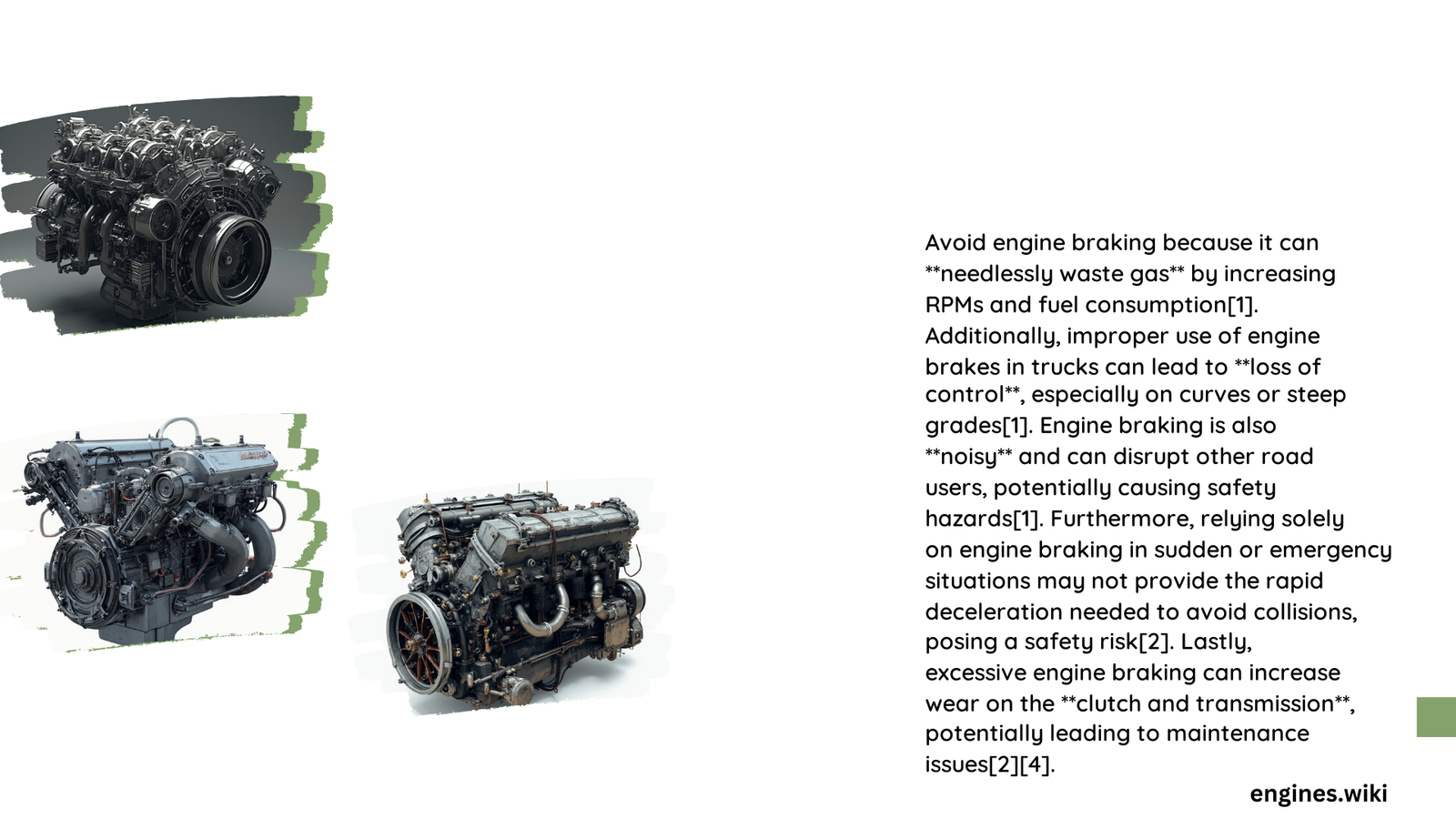Engine braking, while often touted as a fuel-saving technique, comes with potential risks and drawbacks that drivers should consider. This article explores the reasons to avoid engine braking, its impact on vehicle components, and safer alternatives for efficient driving. Understanding these factors can help drivers make informed decisions about their braking techniques and overall vehicle maintenance.
Why Should Drivers Consider Avoiding Engine Brake?
Engine braking, the practice of using the engine’s compression to slow a vehicle, has been a topic of debate among drivers and automotive experts. While it can offer some benefits, there are several compelling reasons why drivers might want to avoid this technique. Let’s delve into the key factors that make engine braking a potentially risky practice.
What Are the Potential Risks to Vehicle Components?
One of the primary concerns with engine braking is the potential damage it can cause to various vehicle components. Here’s a breakdown of the parts that may be affected:
- Transmission: Excessive stress on gears and bearings
- Clutch: Increased wear, especially in manual transmissions
- Engine mounts: Additional strain due to sudden deceleration
- Drivetrain: Increased load and potential for premature wear
While modern vehicles are designed to handle some level of engine braking, frequent or aggressive use can accelerate wear on these components, potentially leading to costly repairs.
How Does Engine Braking Affect Fuel Efficiency?
Contrary to popular belief, engine braking may not always lead to improved fuel efficiency. Here’s why:
- Increased RPMs: Engine braking often requires downshifting, which increases engine RPMs and can lead to higher fuel consumption.
- Momentum loss: Rapid deceleration through engine braking can cause a loss of momentum, requiring more fuel to regain speed.
- Inefficient engine operation: At high RPMs during engine braking, the engine may operate outside its optimal efficiency range.
Table: Fuel Efficiency Comparison
| Braking Method | Fuel Efficiency Impact |
|---|---|
| Engine Braking | Potentially negative |
| Regular Braking | Neutral to positive |
| Coasting | Generally positive |
What Safety Concerns Are Associated with Engine Braking?
Safety should always be a top priority when considering driving techniques. Engine braking presents several safety concerns:
- Lack of brake lights: Engine braking doesn’t activate brake lights, potentially surprising following drivers.
- Reduced control: In slippery conditions, engine braking can cause wheel lock-up and loss of control.
- Distraction: Focusing on engine braking techniques can divert attention from road conditions.
- Inconsistent deceleration: Engine braking may not provide consistent slowing power, especially in emergency situations.
How Does Engine Braking Impact Vehicle Stability?
Vehicle stability is crucial for safe driving, and engine braking can have mixed effects:
- Weight transfer: Sudden deceleration from engine braking can cause abrupt weight transfer, potentially destabilizing the vehicle.
- Traction loss: On slippery surfaces, engine braking can lead to wheel lock-up and loss of traction.
- Uneven braking: Engine braking primarily affects the drive wheels, which can lead to uneven braking force distribution.
What Are the Legal Implications of Engine Braking?
While not universally regulated, engine braking can have legal implications:
- Some jurisdictions have noise ordinances that restrict engine braking, particularly for large trucks.
- In certain areas, excessive engine braking may be considered reckless driving.
- Commercial drivers may face penalties for improper use of engine brakes in restricted zones.
How Does Engine Braking Affect Passenger Comfort?
Passenger comfort is an often-overlooked aspect of driving techniques. Engine braking can negatively impact comfort in several ways:
- Jerky deceleration: Abrupt downshifting can cause sudden jolts.
- Increased noise: Engine braking often results in higher engine noise levels.
- Motion sickness: The irregular deceleration pattern can exacerbate motion sickness in some passengers.
What Are the Alternatives to Engine Braking?
Instead of relying on engine braking, consider these safer and more efficient alternatives:
- Proper use of conventional brakes: Modern brake systems are designed for efficient and safe deceleration.
- Anticipatory driving: Look ahead and adjust speed gradually to minimize the need for sudden braking.
- Coasting: When safe, allow the vehicle to coast to reduce speed gradually.
- Cruise control: Use adaptive cruise control systems for smoother speed management on highways.
How Can Drivers Improve Fuel Efficiency Without Engine Braking?
For those seeking to improve fuel efficiency, consider these techniques:
- Maintain a steady speed and avoid rapid acceleration or deceleration.
- Use cruise control on highways to maintain consistent speed.
- Ensure proper tire inflation for reduced rolling resistance.
- Remove unnecessary weight from the vehicle.
- Plan routes to avoid traffic congestion and frequent stops.
Conclusion

While engine braking may seem like a clever technique to save fuel and reduce brake wear, the potential risks often outweigh the benefits. By understanding the impact on vehicle components, safety, and overall driving experience, drivers can make informed decisions about their braking techniques. Focusing on safe, anticipatory driving and proper use of conventional braking systems can lead to a more efficient, comfortable, and secure driving experience for both drivers and passengers.
References:
1. National Highway Traffic Safety Administration – Braking Techniques
2. Society of Automotive Engineers – Engine Braking Effects
3. American Automobile Association – Fuel Efficiency Tips
4. Federal Motor Carrier Safety Administration – Commercial Driver’s Guide
